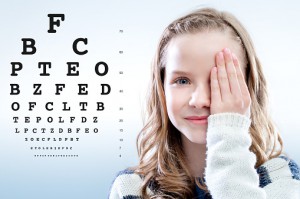When a child can’t see well, you might expect them to verbalize their inability to see clearly or complain of headaches, but a child may not say that they are having trouble with their vision because they don’t realize that the world isn’t supposed to be blurry.
Surprisingly, as many as one out of four children in school have vision problems and a large number of children with vision problems go undetected. When vision impairment goes undiagnosed, their behavior can be misdiagnosed as a learning disability.
Some common signs of vision problems are:
- Omitting letters, words or phrases
- Writing that is difficult to read, crowded or inconsistent in size
- Mistaking words with similar beginnings
- Miscalling or omitting “small” words
- Losing place while reading
- Misaligning digits in columns of numbers
- Writing uphill or downhill
- Reversing letters (d for b) or words (saw for was)
- Rereads or skips words while reading
- Lip reading or whisper reading to reinforce comprehension
Parents and educators may assume that when a child passes a school vision screening, there is no vision problem. However, school vision screenings often only test for visual sharpness. A child who can see 20/20 can still have a vision problem.
If your child exhibits any of the signs and symptoms listed above, you may want to make an appointment for an eye exam with an Ophthalmologist at Jamaica Hospital Medical Center’s Ophthalmology Center. For an appointment, call 718-206-5900.
All content of this newsletter is intended for general information purposes only and is not intended or implied to be a substitute for professional medical advice, diagnosis or treatment. Please consult a medical professional before adopting any of the suggestions on this page. You must never disregard professional medical advice or delay seeking medical treatment based upon any content of this newsletter. PROMPTLY CONSULT YOUR PHYSICIAN OR CALL 911 IF YOU BELIEVE YOU HAVE A MEDICAL EMERGENCY.

